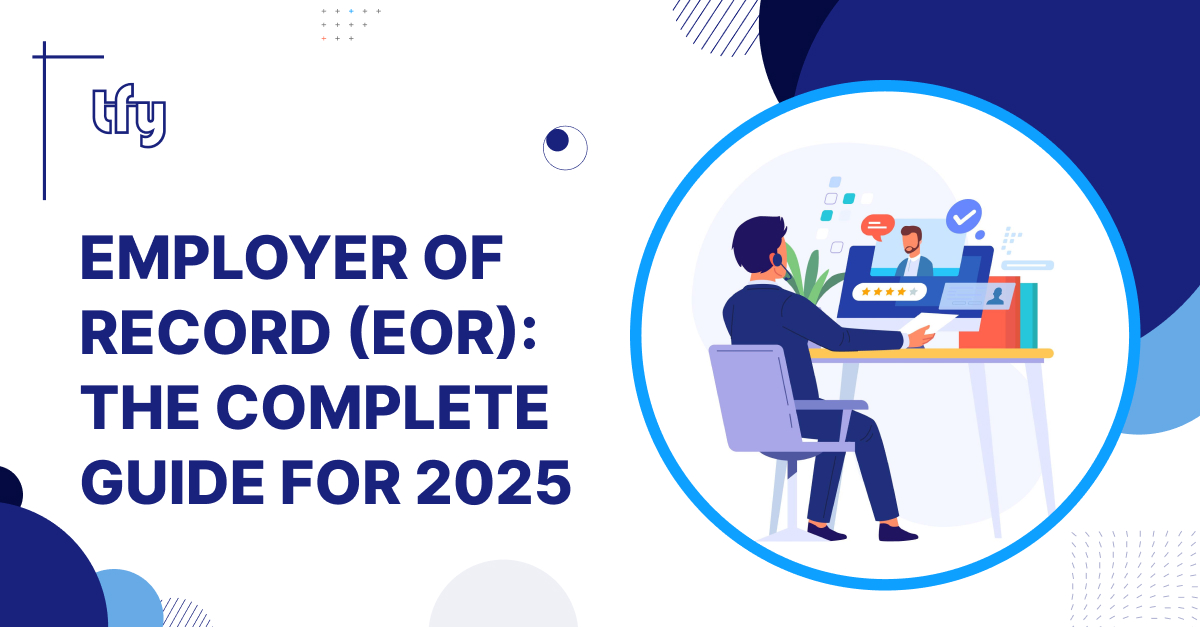
Expanding into new countries is an exciting milestone for any business. But international hiring often brings a wave of compliance challenges—different labor laws, tax regimes, contract requirements, and worker protections. For HR teams and recruiters, this can feel overwhelming. That’s where an Employer of Record (EOR) comes in.
An EOR takes on the legal responsibility for employment in foreign markets, handling payroll, compliance, and HR administration on behalf of your business. With the right EOR partner, companies can focus on growth while reducing risk and complexity.
In this guide, we’ll cover:
- Employer of record meaning
- What an EOR does
- When to use an EOR service
- Benefits of working with an EOR
- How EORs differ from PEOs and staffing agencies
- What to consider when choosing an EOR partner
What is an Employer of Record (EOR)?
An Employer of Record is a third-party service provider that legally employs workers on behalf of another company. While your business directs the day-to-day work, the EOR manages the administrative and compliance responsibilities tied to employment.
This includes:
- Running payroll and issuing payslips
- Filing and paying employment taxes
- Providing legally compliant contracts
- Administering benefits where applicable
- Ensuring adherence to local labor laws
- Handling onboarding and offboarding
The key advantage is that businesses can hire talent in new countries without first setting up a local legal entity—a process that is often costly, time-consuming and comprehensive legal and economic analysis of the EOR model.
What Does an EOR Do in Practice?
An EOR typically provides:
Payroll management: Paying employees or contractors in local currencies and meeting statutory tax obligations.
Compliance oversight: Staying up-to-date with changing employment laws and ensuring proper worker classification.
HR administration: Managing contracts, benefits, and employee records in line with local standards.
Risk mitigation: Assuming liability for compliance issues and protecting clients from fines or disputes.
Your business keeps control over recruitment, performance management, and strategic decisions, while the EOR ensures employment is compliant and seamless.
When Should You Use an EOR?
EOR services are particularly valuable when:
- Expanding into a new country or region.
- Hiring remote employees abroad without opening a local entity.
- Onboarding contractors internationally while avoiding misclassification.
- Merging with or acquiring companies across borders.
- Scaling quickly and needing compliant operations from day one.
The IEC Group talks on why the Employer of Record model is no longer a workaround but a global workforce strategy—and who’s leading the charge in 2025.
Employer of Record Benefits
The benefits of working with an EOR extend far beyond compliance:
1. Faster Global Expansion
Instead of waiting months to establish a local entity, companies can hire talent almost immediately through an EOR already registered in-country.
2. Reduced Risk
EORs take on legal responsibility, meaning fewer compliance headaches for employers. If local laws change, the EOR updates processes to keep you aligned.
3. Lower Costs
The expense of an EOR is often far less than opening subsidiaries, hiring local lawyers, and managing payroll systems in each market.
4. Administrative Relief
By outsourcing time-consuming HR tasks, teams can focus on strategy, growth, and talent development.
5. Contractor Compliance
Misclassification fines can be severe. An EOR ensures workers are properly classified, giving both businesses and talent peace of mind.
Employer of Record success stories with accelerated onboarding and high candidate satisfaction according to Broad Leaf
EOR vs. PEO: What’s the Difference?
Both EORs and PEOs (Professional Employer Organizations) support HR functions, but they differ in scope and liability:
Capability | PEO | EOR |
| Risk Responsibility | Shared (co-employment) | Full legal liability |
| Coverage | Domestic focus, some limited international | Global-first, 180+ countries |
| Entity Setup | Requires local entity | No local entity required |
| Flexibility | Benefits flexibility | Standardized compliance & benefits |
Simply put: PEOs are best for domestic HR support, while EORs are essential for global hiring.
EOR vs. Staffing Agencies
Staffing agencies supply temporary workers for specific projects, but they don’t assume full legal responsibility for long-term employees. If your goal is to lighten compliance burdens and scale globally, an EOR is the more strategic option.
Choosing the Right Employer of Record Partner
When evaluating EOR providers, consider:
- Global reach: Coverage across all regions where you plan to hire.
- Compliance expertise: Knowledge of local employment laws and tax regulations.
- Integrated systems: Payroll, HR, and workforce management in one platform.
- Scalability: Ability to support growth as your team expands.
- Data security: Strong protocols to protect sensitive employee information.
Why Businesses Choose TFY as Their EOR Partner
TFY is more than a traditional EOR—it’s an all-in-one workforce management platform. With coverage in over 180 countries, TFY combines:
- AI-powered ATS for recruiting and sourcing.
- Employer of Record services for global compliance.
- Contractor management to reduce misclassification risks.
- Global payroll and secure, multi-currency payments.
- Workforce analytics for smarter hiring decisions.
Unlike modular providers, TFY offers everything under one roof, giving recruiters, HR teams, and businesses a seamless way to hire, onboard, and pay talent worldwide—without compliance headaches.
Conclusion
Employer of Record Services are essential for companies that want to expand internationally while reducing risk and complexity. By partnering with the right provider, businesses can unlock global talent markets, stay compliant, and scale efficiently.
For organizations that need an EOR built for the future of work, TFY delivers a complete, AI-powered platform that makes global hiring simple, compliant, and cost-effective.



